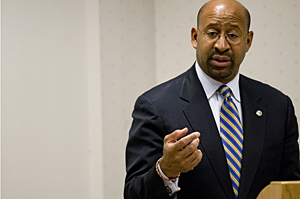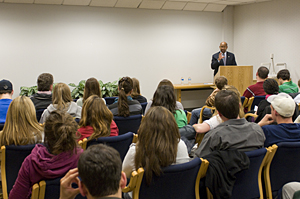
- Rozovsky wins prestigious NSF Early Career Award
- UD students meet alumni, experience 'closing bell' at NYSE
- Newark Police seek assistance in identifying suspects in robbery
- Rivlin says bipartisan budget action, stronger budget rules key to reversing debt
- Stink bugs shouldn't pose problem until late summer
- Gao to honor Placido Domingo in Washington performance
- Adopt-A-Highway project keeps Lewes road clean
- WVUD's Radiothon fundraiser runs April 1-10
- W.D. Snodgrass Symposium to honor Pulitzer winner
- New guide helps cancer patients manage symptoms
- UD in the News, March 25, 2011
- For the Record, March 25, 2011
- Public opinion expert discusses world views of U.S. in Global Agenda series
- Congressional delegation, dean laud Center for Community Research and Service program
- Center for Political Communication sets symposium on politics, entertainment
- Students work to raise funds, awareness of domestic violence
- Equestrian team wins regional championship in Western riding
- Markell, Harker stress importance of agriculture to Delaware's economy
- Carol A. Ammon MBA Case Competition winners announced
- Prof presents blood-clotting studies at Gordon Research Conference
- Sexual Assault Awareness Month events, programs announced
- Stay connected with Sea Grant, CEOE e-newsletter
- A message to UD regarding the tragedy in Japan
- More News >>
- March 31-May 14: REP stages Neil Simon's 'The Good Doctor'
- April 2: Newark plans annual 'wine and dine'
- April 5: Expert perspective on U.S. health care
- April 5: Comedian Ace Guillen to visit Scrounge
- April 6, May 4: School of Nursing sponsors research lecture series
- April 6-May 4: Confucius Institute presents Chinese Film Series on Wednesdays
- April 6: IPCC's Pachauri to discuss sustainable development in DENIN Dialogue Series
- April 7: 'WVUDstock' radiothon concert announced
- April 8: English Language Institute presents 'Arts in Translation'
- April 9: Green and Healthy Living Expo planned at The Bob
- April 9: Center for Political Communication to host Onion editor
- April 10: Alumni Easter Egg-stravaganza planned
- April 11: CDS session to focus on visual assistive technologies
- April 12: T.J. Stiles to speak at UDLA annual dinner
- April 15, 16: Annual UD push lawnmower tune-up scheduled
- April 15, 16: Master Players series presents iMusic 4, China Magpie
- April 15, 16: Delaware Symphony, UD chorus to perform Mahler work
- April 18: Former NFL Coach Bill Cowher featured in UD Speaks
- April 21-24: Sesame Street Live brings Elmo and friends to The Bob
- April 30: Save the date for Ag Day 2011 at UD
- April 30: Symposium to consider 'Frontiers at the Chemistry-Biology Interface'
- April 30-May 1: Relay for Life set at Delaware Field House
- May 4: Delaware Membrane Protein Symposium announced
- May 5: Northwestern University's Leon Keer to deliver Kerr lecture
- May 7: Women's volleyball team to host second annual Spring Fling
- Through May 3: SPPA announces speakers for 10th annual lecture series
- Through May 4: Global Agenda sees U.S. through others' eyes; World Bank president to speak
- Through May 4: 'Research on Race, Ethnicity, Culture' topic of series
- Through May 9: Black American Studies announces lecture series
- Through May 11: 'Challenges in Jewish Culture' lecture series announced
- Through May 11: Area Studies research featured in speaker series
- Through June 5: 'Andy Warhol: Behind the Camera' on view in Old College Gallery
- Through July 15: 'Bodyscapes' on view at Mechanical Hall Gallery
- More What's Happening >>
- UD calendar >>
- Middle States evaluation team on campus April 5
- Phipps named HR Liaison of the Quarter
- Senior wins iPad for participating in assessment study
- April 19: Procurement Services schedules information sessions
- UD Bookstore announces spring break hours
- HealthyU Wellness Program encourages employees to 'Step into Spring'
- April 8-29: Faculty roundtable series considers student engagement
- GRE is changing; learn more at April 15 info session
- April 30: UD Evening with Blue Rocks set for employees
- Morris Library to be open 24/7 during final exams
- More Campus FYI >>
3:01 p.m., April 1, 2009----In his second University of Delaware appearance in two weeks, Philadelphia Mayor Michael A. Nutter described the challenges and opportunities of managing a major city in the midst of a national and international financial crisis.
Nutter's talk on Thursday, March 26, in the Center for Composite Materials, was held in conjunction with the Contemporary Issues in Public Administration lecture series presented by UD's School of Urban Affairs and Public Policy.
“It's been interesting, and things have been going along well. We came in with a lot of ideas and proposals, and as a reform candidate I ran on a platform of change,” Nutter said. “People wanted change, and then, our lives changed with this economic crisis.”
The global scale of the financial crisis, considered by many economists to be the greatest economic downturn since the Great Depression, has resulted in changing the entire dynamic of what is happening in America's sixth largest city, Nutter said.
“There was a precipitous drop in virtually every revenue source we have, and people were going out of business, with folks losing their jobs,” Nutter said. “I took office in January 2008, and we started seeing some of this in the spring of 2008, and in the fall you saw Merrill Lynch, Bear Stearns, Lehman Brothers, Fannie Mae and Freddie Mac, AIG and a bunch of other firms and banks that were all in a state of freefall and collapse.”
The drop in revenue resulted in Philadelphia having to submit two consecutive projected budget deficits in excess of $1 billion, Nutter said.
Because of a budget crisis in the early 1990s, Philadelphia must file a five-year budget plan with the Pennsylvania Intergovernmental Cooperation Authority (PICA), an oversight agency, Nutter said.
“Their job is to oversee our finances. They can't exactly tell us what to do, but we are required to file five-year budgets, with every year of the five-year plan having to be balanced, so there are no tricks, no games, no nothing,” Nutter said. “You have to show where you are getting your revenues from, as well as where you are getting your savings from.”
To fill in the initial projected budget shortfall, Nutter said the city proposed a series of reductions in service, including closing some libraries and taking equipment out of some fire stations, both measures which were not warmly embraced by citizens in the City of Brotherly Love.
“I don't know about you here in Delaware, but Philadelphians have tremendous lungs and very loud voices,” Nutter said. “Those voices will be heard, and we heard them. We ended up not closing the 11 libraries. They are open and staying busy.”
Public outreach
Nutter said that last year the city began an extensive and exhaustive public information and education outreach campaign consisting of eight town hall meetings to hear citizen opinions and to present a case for projected cuts in services and increases in sales and property taxes.
“The purpose was twofold -- one was to hear from people about the cuts we had already made,” Nutter said. “We knew they were going to be upset, but this gave them an opportunity to express themselves and we learned a great deal.”
A further series of budget workshops open to the public asked individuals to list programs they would keep or cut, with the caveat that the budget they submitted had to be balanced.
“Part of the point was to demonstrate to people just how difficult it is to match up all of these services, and what your priorities are,” Nutter said. “Putting a budget together is about your priorities and about your values and your vision for the future.”
While support for public safety services, including police and firefighters, remains strong, citizens also want support for social services, homeless programs and programs for children and vulnerable members of the population, Nutter said.
In describing himself as a leading tax cut advocate during the last decade in Philadelphia, Nutter said it was especially difficult for him to propose temporary increases in sales and property taxes.
“We chose not to touch wage and business taxes,” Nutter said. “I also chose to operate on the principle that in this short term economic crisis we should not take actions that will have long-term economic implications.”
Challenges of leadership
Leadership in such situations is a real challenge that requires making a constant series of decisions, some on a daily basis, Nutter said.
“Some of these you have to make with speed and limited information, and sometimes you get to take a little more time. A whole day would be a long period of time to have to make a decision,” Nutter said. “It is a decision-making job, and you are not going to make everybody happy. If you are in this position and can make everyone happy, I can assure you that you are not trying to do anything.”
Despite dealing with the results of tough economic times and hard decisions, there are many positive aspects to living and working in Philadelphia, Nutter said.
“We have an incredible park system, and we are making progress in developing a waterfront, as well as growth in Center City and in many of our neighborhoods,” Nutter said. “We have single stream recycling, a new 311 system and we also have restored a sense of integrity and open and honest government, something that citizens wanted.”
While Nutter believes that the American Recovery and Reinvestment Act 2009, or stimulus bill, will be helpful, he said it won't immediately solve the financial problems of Philadelphia and other major American urban centers.
“The theory is that if you put people to work, you get business going, and that generates additional tax revenues, and that we get those revenues and eventually get back to an era of prosperity,” Nutter said. “In the meantime, we have to live in the years in between. I think it is going to take us about a year and a half or two years to come out of this crisis, and that is why we have to make the cuts as well as raise some taxes temporarily.”
Public service
Nutter also said that with all of its challenges and frustrations, there is no greater call than being involved in some aspect of public service.
“I love what I do. I can tell your for an absolute fact that when you work in local government, you know on a daily basis that your actions can have a positive impact on lives of people almost immediately,” Nutter said. “You see the results of your work and there is just something about that feeling of knowing that you have helped someone through a critical situation that is tremendously rewarding.”
For individuals seeking public office, Nutter recommends getting involved in a political campaign.
“Somebody is always running for something, and the best way I found, and how I got involved in politics, is to work on a campaign and to learn what is going on from the inside,” Nutter said. “If you decide to run for office, that is great. If you decide to be on the other side and be more of a support person, there is a role for everyone in public service and in politics.”
On a personal level, Nutter said that being actively engaged affords individuals the sense of accomplishment that comes from making decisions that may positively affect their lives and the lives of others in the future.
“That is why I got involved in public service in the first place,” Nutter said. “I would rather be on the field and playing than sitting on the sidelines, watching.”
Article by Jerry Rhodes
Photos by Kathy Atkinson



